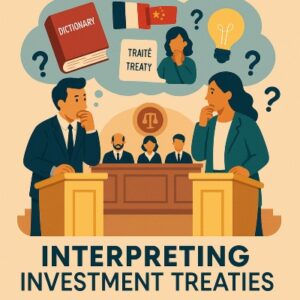Interpreting treaties in investment arbitration is central to resolving disputes where the applicable international instruments are often complex and open to competing readings. Practical interpretation determines jurisdiction, scope of protection and ultimately the outcome of disputes. In a previous note, we outlined how investment tribunals approach treaty interpretation. In this note, we take a closer […]
Investment Arbitration
Shareholder Claims for Reflective Loss in Investor-State Arbitration: An Overview
Reflective losses are indirect losses, such as a decrease in the value of the shares, suffered by shareholders as a result of harm to the company in which their shares are held.[1] Reflective losses differ from direct losses suffered by shareholders, which may occur through the seizure of shares or barriers to shareholder attendance of […]
Which Foreign Investors Could Sue Trump’s United States in Arbitration?
Since taking office for the second time, President Trump has unleashed a torrent of executive orders aimed at reshaping America’s legal and political landscape — from immigration and climate change to trade, civil rights, energy policy, and tariffs.[1] His unpredictable approach to governance has sparked domestic and international concerns, particularly among foreign investors who may […]
Investment Arbitration and the Never-Ending MOL v. Croatia Saga
The intersection of international investment law and domestic politics often leads to high-profile arbitration cases, with the annulment of awards frequently making headlines. One such case is the long-standing dispute between the Hungarian energy company MOL Group and the Republic of Croatia. The saga encapsulates the complex dynamics of investment arbitration, allegations of corruption, and […]
Assignment in Investment Arbitration
The assignment of arbitration agreements has been the subject of multiple rulings by domestic courts of various countries. This body of case law, with its own principles, is not directly applicable to assignment in investment arbitration. Assignment is the transfer of rights, property or other benefits from an assignor to an assignee. In investment arbitration, […]
Judicial Expropriation in Investor-State Arbitration
Investor-State arbitrations involving unlawful expropriation are often concentrated on acts from a State’s legislative or executive branch. In this configuration, acts such as executive orders or laws are how a State may expropriate foreign investors. In turn, a lesser-known type of expropriation is judicial expropriation, which can be defined as “[t]he taking of contractual and […]
Environmental Concerns in Investment Arbitration
Traditionally, investment arbitration and environmental protection existed in separate spheres, with the former primarily focused on protecting the rights of investors and the latter concerned with safeguarding the environment. However, this separation has blurred as environmental issues have gained prominence on the international stage. In recent years, the intersection of environmental concerns and investment arbitration […]
Intra-EU Investment Arbitration After Achmea
This note looks into the reality of intra-EU investment arbitration after the judgment of the Court of Justice of the European Union in Achmea. Achmea was initially referred to as a groundbreaking decision, which caused further steps to be taken to prevent intra-EU investment arbitration. However, recent decisions and judgments may call into question the […]
Enforcement of Investment Arbitration Awards
International investment arbitration has emerged as a vital component of international business law, offering a specialised mechanism for resolving disputes between foreign investors and host States of investment. The enforcement of investment arbitration awards is one of the most critical aspects of the dispute resolution process. Unless the decisions reached were legally binding and effectively […]








